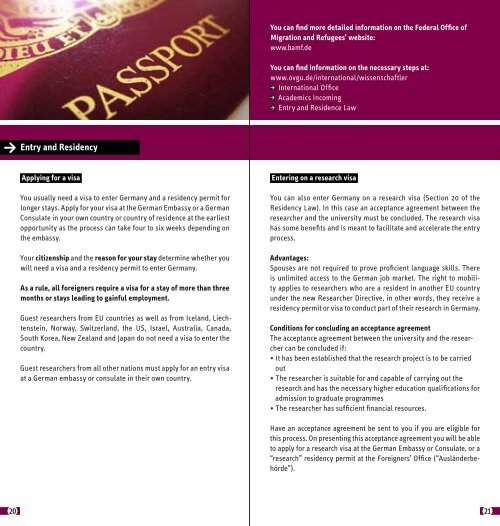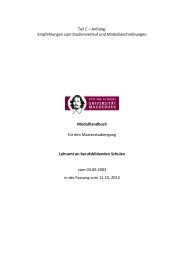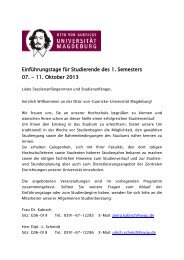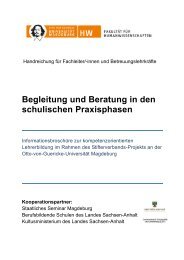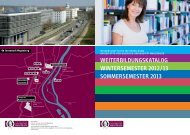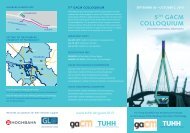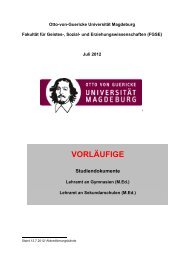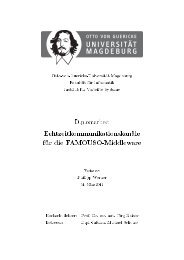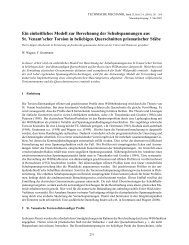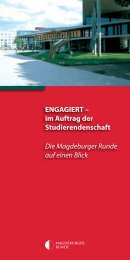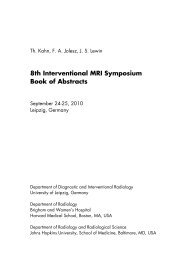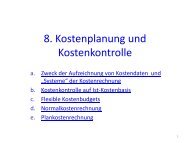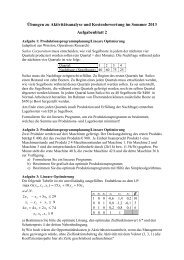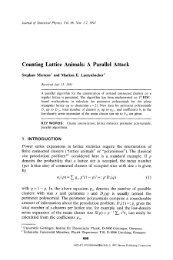Welcome to Magdeburg Welcome to Magdeburg
Welcome to Magdeburg Welcome to Magdeburg
Welcome to Magdeburg Welcome to Magdeburg
You also want an ePaper? Increase the reach of your titles
YUMPU automatically turns print PDFs into web optimized ePapers that Google loves.
Entry and Residency<br />
Applying for a visa<br />
You usually need a visa <strong>to</strong> enter Germany and a residency permit for<br />
longer stays. Apply for your visa at the German Embassy or a German<br />
Consulate in your own country or country of residence at the earliest<br />
opportunity as the process can take four <strong>to</strong> six weeks depending on<br />
the embassy.<br />
Your citizenship and the reason for your stay determine whether you<br />
will need a visa and a residency permit <strong>to</strong> enter Germany.<br />
As a rule, all foreigners require a visa for a stay of more than three<br />
months or stays leading <strong>to</strong> gainful employment.<br />
Guest researchers from EU countries as well as from Iceland, Liechtenstein,<br />
Norway, Switzerland, the US, Israel, Australia, Canada,<br />
South Korea, New Zealand and Japan do not need a visa <strong>to</strong> enter the<br />
country.<br />
Guest researchers from all other nations must apply for an entry visa<br />
at a German embassy or consulate in their own country.<br />
You can find more detailed information on the Federal Office of<br />
Migration and Refugees’ website:<br />
www.bamf.de<br />
You can find information on the necessary steps at:<br />
www.ovgu.de/international/wissenschaftler<br />
International Office<br />
Academics Incoming<br />
Entry and Residence Law<br />
Entering on a research visa<br />
You can also enter Germany on a research visa (Section 20 of the<br />
Residency Law). In this case an acceptance agreement between the<br />
researcher and the university must be concluded. The research visa<br />
has some benefits and is meant <strong>to</strong> facilitate and accelerate the entry<br />
process.<br />
Advantages:<br />
Spouses are not required <strong>to</strong> prove proficient language skills. There<br />
is unlimited access <strong>to</strong> the German job market. The right <strong>to</strong> mobility<br />
applies <strong>to</strong> researchers who are a resident in another EU country<br />
under the new Researcher Directive, in other words, they receive a<br />
residency permit or visa <strong>to</strong> conduct part of their research in Germany.<br />
Conditions for concluding an acceptance agreement<br />
The acceptance agreement between the university and the researcher<br />
can be concluded if:<br />
• It has been established that the research project is <strong>to</strong> be carried<br />
out<br />
• The researcher is suitable for and capable of carrying out the<br />
research and has the necessary higher education qualifications for<br />
admission <strong>to</strong> graduate programmes<br />
• The researcher has sufficient financial resources.<br />
Have an acceptance agreement be sent <strong>to</strong> you if you are eligible for<br />
this process. On presenting this acceptance agreement you will be able<br />
<strong>to</strong> apply for a research visa at the German Embassy or Consulate, or a<br />
“research” residency permit at the Foreigners’ Office (“Ausländerbehörde”).<br />
20 21


